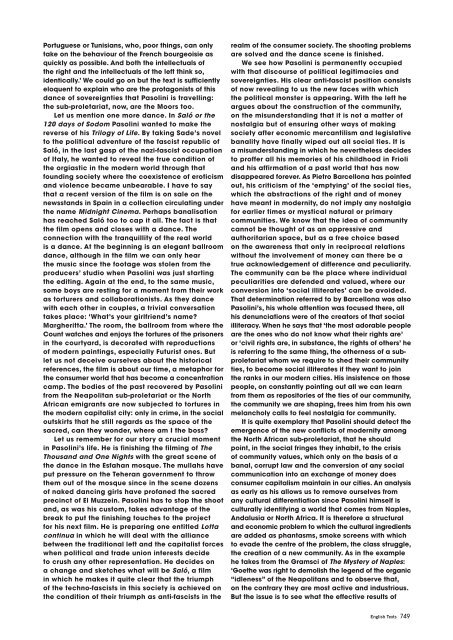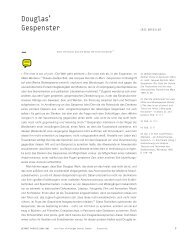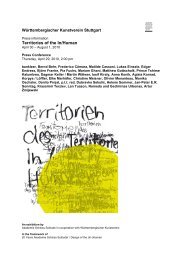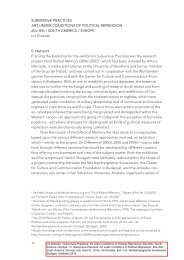English Texts
English Texts
English Texts
Create successful ePaper yourself
Turn your PDF publications into a flip-book with our unique Google optimized e-Paper software.
Portuguese or Tunisians, who, poor things, can only<br />
take on the behaviour of the French bourgeoisie as<br />
quickly as possible. And both the intellectuals of<br />
the right and the intellectuals of the left think so,<br />
identically.’ We could go on but the text is sufficiently<br />
eloquent to explain who are the protagonists of this<br />
dance of sovereignties that Pasolini is travelling:<br />
the sub-proletariat, now, are the Moors too.<br />
Let us mention one more dance. In Saló or the<br />
120 days of Sodom Pasolini wanted to make the<br />
reverse of his Trilogy of Life. By taking Sade’s novel<br />
to the political adventure of the fascist republic of<br />
Saló, in the last gasp of the nazi-fascist occupation<br />
of Italy, he wanted to reveal the true condition of<br />
the orgiastic in the modern world through that<br />
founding society where the coexistence of eroticism<br />
and violence became unbearable. I have to say<br />
that a recent version of the film is on sale on the<br />
newsstands in Spain in a collection circulating under<br />
the name Midnight Cinema. Perhaps banalisation<br />
has reached Saló too to cap it all. The fact is that<br />
the film opens and closes with a dance. The<br />
connection with the tranquillity of the real world<br />
is a dance. At the beginning is an elegant ballroom<br />
dance, although in the film we can only hear<br />
the music since the footage was stolen from the<br />
producers’ studio when Pasolini was just starting<br />
the editing. Again at the end, to the same music,<br />
some boys are resting for a moment from their work<br />
as torturers and collaborationists. As they dance<br />
with each other in couples, a trivial conversation<br />
takes place: ‘What’s your girlfriend’s name?<br />
Margheritta.’ The room, the ballroom from where the<br />
Count watches and enjoys the tortures of the prisoners<br />
in the courtyard, is decorated with reproductions<br />
of modern paintings, especially Futurist ones. But<br />
let us not deceive ourselves about the historical<br />
references, the film is about our time, a metaphor for<br />
the consumer world that has become a concentration<br />
camp. The bodies of the past recovered by Pasolini<br />
from the Neapolitan sub-proletariat or the North<br />
African emigrants are now subjected to tortures in<br />
the modern capitalist city: only in crime, in the social<br />
outskirts that he still regards as the space of the<br />
sacred, can they wonder, where am I the boss?<br />
Let us remember for our story a crucial moment<br />
in Pasolini’s life. He is finishing the filming of The<br />
Thousand and One Nights with the great scene of<br />
the dance in the Esfahan mosque. The mullahs have<br />
put pressure on the Teheran government to throw<br />
them out of the mosque since in the scene dozens<br />
of naked dancing girls have profaned the sacred<br />
precinct of El Muzzein. Pasolini has to stop the shoot<br />
and, as was his custom, takes advantage of the<br />
break to put the finishing touches to the project<br />
for his next film. He is preparing one entitled Lotta<br />
continua in which he will deal with the alliance<br />
between the traditional left and the capitalist forces<br />
when political and trade union interests decide<br />
to crush any other representation. He decides on<br />
a change and sketches what will be Saló, a film<br />
in which he makes it quite clear that the triumph<br />
of the techno-fascists in this society is achieved on<br />
the condition of their triumph as anti-fascists in the<br />
realm of the consumer society. The shooting problems<br />
are solved and the dance scene is finished.<br />
We see how Pasolini is permanently occupied<br />
with that discourse of political legitimacies and<br />
sovereignties. His clear anti-fascist position consists<br />
of now revealing to us the new faces with which<br />
the political monster is appearing. With the left he<br />
argues about the construction of the community,<br />
on the misunderstanding that it is not a matter of<br />
nostalgia but of ensuring other ways of making<br />
society after economic mercantilism and legislative<br />
banality have finally wiped out all social ties. It is<br />
a misunderstanding in which he nevertheless decides<br />
to proffer all his memories of his childhood in Frioli<br />
and his affirmation of a past world that has now<br />
disappeared forever. As Pietro Barcellona has pointed<br />
out, his criticism of the ‘emptying’ of the social ties,<br />
which the abstractions of the right and of money<br />
have meant in modernity, do not imply any nostalgia<br />
for earlier times or mystical natural or primary<br />
communities. We know that the idea of community<br />
cannot be thought of as an oppressive and<br />
authoritarian space, but as a free choice based<br />
on the awareness that only in reciprocal relations<br />
without the involvement of money can there be a<br />
true acknowledgement of difference and peculiarity.<br />
The community can be the place where individual<br />
peculiarities are defended and valued, where our<br />
conversion into ‘social illiterates’ can be avoided.<br />
That determination referred to by Barcellona was also<br />
Pasolini’s, his whole attention was focused there, all<br />
his denunciations were of the creators of that social<br />
illiteracy. When he says that ‘the most adorable people<br />
are the ones who do not know what their rights are’<br />
or ‘civil rights are, in substance, the rights of others’ he<br />
is referring to the same thing, the otherness of a subproletariat<br />
whom we require to shed their community<br />
ties, to become social illiterates if they want to join<br />
the ranks in our modern cities. His insistence on those<br />
people, on constantly pointing out all we can learn<br />
from them as repositories of the ties of our community,<br />
the community we are shaping, frees him from his own<br />
melancholy calls to feel nostalgia for community.<br />
It is quite exemplary that Pasolini should detect the<br />
emergence of the new conflicts of modernity among<br />
the North African sub-proletariat, that he should<br />
point, in the social fringes they inhabit, to the crisis<br />
of community values, which only on the basis of a<br />
banal, corrupt law and the conversion of any social<br />
communication into an exchange of money does<br />
consumer capitalism maintain in our cities. An analysis<br />
as early as his allows us to remove ourselves from<br />
any cultural differentiation since Pasolini himself is<br />
culturally identifying a world that comes from Naples,<br />
Andalusia or North Africa. It is therefore a structural<br />
and economic problem to which the cultural ingredients<br />
are added as phantasms, smoke screens with which<br />
to evade the centre of the problem, the class struggle,<br />
the creation of a new community. As in the example<br />
he takes from the Gramsci of The Mystery of Naples:<br />
‘Goethe was right to demolish the legend of the organic<br />
“idleness” of the Neapolitans and to observe that,<br />
on the contrary they are most active and industrious.<br />
But the issue is to see what the effective results of<br />
<strong>English</strong> <strong>Texts</strong> 749










